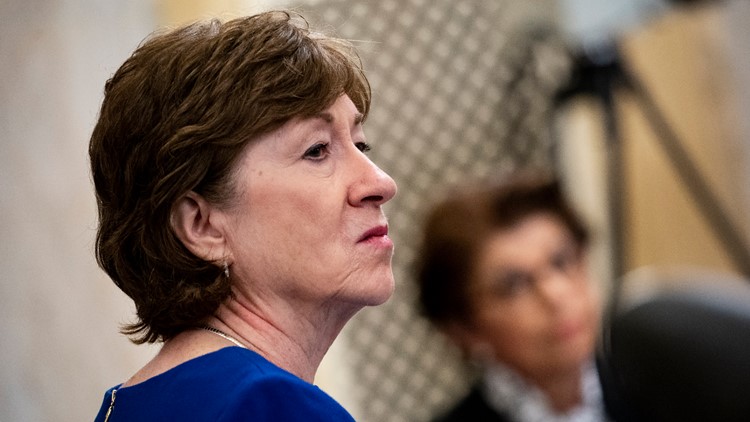WASHINGTON, D.C., USA — On Monday the Supreme Court narrowly struck down a Louisiana law regulating abortion clinics. Chief Justice John G. Roberts Jr. became the crucial swing vote, joining the four more liberal justices in ruling that the law requiring doctors who perform abortions have admitting privileges at nearby hospitals violates the abortion right the court first announced in the landmark Roe v. Wade decision in 1973.
Brett Kavanaugh was among the four who dissented, sparking renewed criticism of Sen. Susan Collins (R-Maine), who voted to confirm Kavanaugh despite her stance supporting abortion rights.
In a statement to NEWS CENTER Maine, Collins said she agrees with the Supreme Court's decision, "which recognizes the burden that the Louisiana statute could impose."
"Some have tried to suggest that this opinion is an indication of how certain justices would vote on the question of whether abortion will remain legal. That is reading too much into this specific decision," Collins continued. "As Justice Gorsuch noted, 'In truth, Roe v. Wade is not even at issue here.' And while Justice Kavanaugh called for additional fact finding in this case, he gave no indication in his dissenting opinion that he supports overturning Roe."
President Donald Trump’s two appointees, Justices Neil Gorsuch and Brett Kavanaugh, fueled hopes among abortion opponents, and fears on the other side, that the Supreme Court would be more likely to uphold restrictions.
In 2018 when Kavanaugh was appointed, Collins herself was a crucial swing vote in the Senate because of her support of abortion rights and because she voted against repealing the Affordable Care Act. Democrats, who were in the minority, saw Collins and another Republican senator as possibly voting “no” on the confirmation. The Republicans couldn’t spare Collins’ vote to confirm Kavanaugh.
On October 5, 2018, she voted “yes” on confirming Kavanaugh, and the next day he was confirmed into the Supreme Court.
After her vote, she said she was assured by Kavanaugh that he believes, “the concept of precedent is rooted in Article III of the Constitution, and he clearly reveres our Constitution” Roe v. Wade included.
"I have always been concerned about preserving Roe v. Wade,” Collins said in an interview with CNN on Monday following the Louisiana law Supreme Court decision. "He said under oath many times, as well as to me personally many times, that he considers Roe to be 'precedent upon precedent' because it had been reaffirmed in the Casey v Planned Parenthood case.”
Annie Clark, Communications Director for Collins, told NEWS CENTER Maine Collins has voted to confirm six of the nine current Supreme Court Justices and that while they often don't rule the same way in a case, Collins "still agrees with her decisions to confirm each of them."
"To say that this case, this most recent case, in which he wrote a very careful dissent, tells you that he's going to repeal Roe v Wade I think is absurd," Collins said in her CNN interview.
Democrat Sara Gideon, who is looking to unseat Collins in the upcoming election, said in a statement, "While a welcome victory, this decision does not undo years of systematic attacks on reproductive rights by the Trump administration and Republicans across the country. Senator Collins has consistently enabled those efforts by voting to confirm anti-choice nominees like Justice Kavanaugh, who voted today to restrict access to reproductive rights and showed that he will not respect precedent."
During a NARAL Pro-Choice America virtual discussion on Monday night, Gideon voiced her criticism of Collins’ vote confirming Kavanaugh.
Gideon said Kavanaugh, “did the exact opposite of what Susan Collins professed over and over again that she was sure that he would do—and that is respecting the precedent of Roe v. Wade."
"We are still very much in danger in terms of reproductive health care and access to that for all people in this country," Gideon, who has been endorsed by Planned Parenthood, added.
"The bottom line is that [Collins] has always believed in a woman's right to choose and nothing about [Monday's] decisions changes the law," Collins' spokesman Kelley said.
The Associated Press contributed to this report.



